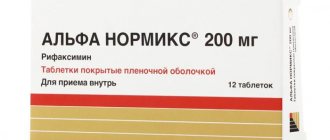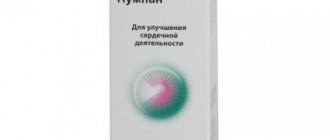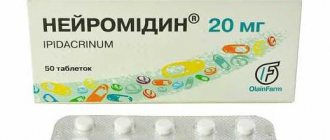For many diseases, antibiotics are an integral part of successful therapy. At the same time, the main condition for undergoing treatment with the help of such drugs is strict adherence to the protocol for taking these drugs. In other words, if the course of treatment is scheduled for a week, then it is not advisable to cancel or increase the dose yourself.
One of the most effective antibiotic drugs is Alpha Normix (reviews confirm this), but in what cases a specialist can prescribe it and how this medication affects the human body, we will consider below.
What is Alpha Normix?
"Alpha Normix" is a semi-synthetic antibiotic that has a wide spectrum of action on the intestinal tract. By using this drug, you can reduce the intestinal bacterial load that occurs in certain pathological conditions. This medicine was developed in such a way as to fight the so-called bad bacteria without damaging the good ones.
The drug "Alpha Normix" (reviews on this matter are mostly positive) works effectively in the following cases:
- when harmful bacteria produce ammonia or other toxic compounds that may participate in the pathogenesis of hepatic encephalopathy;
- with excessive growth of harmful microorganisms in the human intestine;
- at risk of complications due to infection after surgery.
It is also important to note the fact that, due to its activity against the bacteria Helicobacter pylori, this medication is successfully used to treat most forms of chronic gastritis. Moreover, the drug “Alpha Normix” (reviews about this are only positive) is able to effectively suppress staphylococcus in the human body, so it is often and successfully used in therapy for cholecystitis and chronic inflammation of the gallbladder.
Pharmacodynamics and pharmacokinetics
The drug contains the active substance in alpha form. It is an antibiotic belonging to the rifampicin . The active substance has the property of binding the beta subunits of the DNA-dependent enzyme of bacteria, thus, rifaximin inhibits the process of RNA and protein synthesis in bacterial cells. This process is irreversible, the bacterium dies.
The product is sensitive to a variety of gram-positive and gram-negative bacteria .
In the intestine, the antibiotic is not absorbed and does not enter the systemic bloodstream; therefore, the substance affects only the intestinal microflora and significantly reduces the level of pathogenic intestinal bacterial flora. However, the antibiotic rarely causes serious adverse reactions.
The drug reduces:
- the amount of ammonia and other waste products of bacteria;
- the number of bacteria present in colonic diverticula , thereby reducing inflammation around the diverticular sac , eliminating symptoms and reducing the risk of complications from diverticular disease ;
- proliferation of microorganisms (if it is increased due to bacterial overgrowth syndrome in the intestines);
- a specific antigenic stimulus that can initiate and maintain chronic inflammation in the intestine;
- the risk of infectious complications arising after or during colorectal surgery. operations.
Less than one percent of the antibiotic is absorbed through the gastric mucosa. It is not detected in the blood after administration (sometimes present in small quantities). At a maximum daily dose of 0.8 g, it reaches its peak concentration in the intestines within three hours. It is then found in urine, but in an amount of less than one percent.
Composition of "Alpha Normix" and release form
This drug can be purchased in two forms: in the form of granules for preparing a suspension and in tablets. In any type of this drug, the active substance is rifamixin. In addition to the main constituent element, Alpha Normix (reviews from doctors confirm this) includes the following substances:
- carboxymethyl starch;
- palmiostearate;
- microcrystalline cellulose;
- titanium dioxide;
- talc and other substances.
If you purchase “Alpha Normix” for Helicobacter (reviews also confirm this) in the form of granules for preparing a suspension, then this preparation also contains additional flavoring, sucrose and pectin. Therefore, people who have an individual intolerance to one of the components described above are strictly prohibited from using this drug in the form of a suspension. In any case, first of all you should consult a specialist.
Compound
1 tablet contains 200 mg of the active ingredient rifaximin + additional substances (sodium carboxymethyl starch, microcrystalline cellulose, glycerol palmitostearate, colloidal silicon dioxide, talc, hypromellose, E172, titanium dioxide, disodium edetate, propylene glycol).
For 5 ml of a pre-prepared suspension of the drug there is 100 mg of rifaximin + additional ingredients (sodium carmellose, kaolin, sodium benzoate, wild cherry flavor, microcrystalline cellulose, pectin, sodium saccharinate, sucrose).
In what cases is Alpha Normix indicated for use?
"Alpha Normix" for dysbiosis (reviews confirm the effectiveness of therapy) is often prescribed. But it is an effective intestinal antibiotic, which is also used to treat gastrointestinal infections caused by bacteria, namely:
- for acute gastrointestinal infections;
- with "travelers' diarrhea";
- with hepatic encephalopathy;
- for chronic intestinal inflammation;
- with irritable bowel syndrome;
- with hepatic coma;
- with liver failure.
The popularity of the drug "Alpha Normix" is not affected by the price. It is actively used for salmonellosis (reviews are also positive).
Experts quite often prescribe it as a prophylactic drug to prevent the development of infectious complications after colorectal surgical procedures. Your doctor can give you detailed information about this drug. He will also make an appointment if necessary.
How is this drug used?
The instructions for use for the drug "Alpha Normix" (reviews note the accessibility of the information in it) indicate that this drug should be used only as prescribed by a doctor. Self-prescription and use are not recommended at all.
According to the instructions, adults and children under 12 years of age should take 1 tablet every eight hours or 2 tablets every 12 hours. According to the antibiotic treatment protocol, the course of therapy with this particular drug should be a maximum of a week, taking into account the general condition of the patient. In some cases, the attending physician may reduce or, conversely, increase the course of treatment.
If there is a need for a second course, it is prescribed no earlier than 20 days later. It is worth noting that, on the recommendation of a doctor, the dosage and frequency of taking this drug can be changed.
In some cases, a specialist may prescribe this antibiotic in the form of a suspension. In this case, to prepare it, you must first shake the bottle with granules and fill it with boiled water at room temperature to the 60 ml mark. Then shake vigorously until the granules with water turn into a homogeneous suspension. The prepared mixture can be stored for seven days at room temperature no higher than 30 degrees. Shake the bottle thoroughly before each use.
This is confirmed by reviews of the drug "Alpha Normix".
Alpha normix (gran.d/susp.0.1/5ml 60ml)
A country
The country of production may vary depending on the batch of goods. Please check with the operator for detailed information when confirming your order.
Compound
Bottle 60 ml
Rifaximin (with polymorphic alpha structure) 1.2 g. Excipients: microcrystalline cellulose - 70 mg, sodium carmellose - 710 mg, pectin - 780 mg, kaolin - 4.002 g, sodium saccharinate - 60 mg, sodium benzoate - 36 mg, sucrose - 17.28 g, cherry flavor (wild cherry) - 240 mg. 60 ml - dark glass bottles (1) complete with a measuring cup - cardboard packs. Granules for the preparation of a suspension for oral administration are orange in color, with the smell and taste of cherries (wild cherries).
pharmachologic effect
Rifaximin is a broad-spectrum antibiotic from the rifamycin group. Like other representatives of this group, it irreversibly binds the beta subunits of the bacterial enzyme DNA-dependent RNA polymerase and, therefore, inhibits the synthesis of RNA and bacterial proteins. As a result of irreversible binding to the enzyme, rifaximin exhibits bactericidal properties against sensitive bacteria. The drug has a wide spectrum of antimicrobial activity, including most gram-negative and gram-positive, aerobic and anaerobic bacteria. The broad antibacterial spectrum of rifaximin helps reduce the pathogenic intestinal bacterial load, which causes some pathological conditions. The drug reduces: - the formation of ammonia and other toxic compounds by bacteria, which in the case of severe liver disease, accompanied by impaired detoxification, play a role in the pathogenesis and clinical manifestations of hepatic encephalopathy; - increased proliferation of bacteria in the syndrome of excessive growth of microorganisms in the intestines; - the presence in the colon diverticulum of bacteria that may be involved in inflammation in and around the diverticular sac and may play a key role in the development of symptoms and complications of diverticular disease; — the intensity of the antigenic stimulus, which, in the presence of genetically determined defects in the immunoregulation of the mucosa and/or in the protective function, can initiate or constantly maintain chronic intestinal inflammation; — the risk of infectious complications during colorectal surgery. Mechanism of resistance The development of resistance to rifaximin is caused by reversible damage to the rB gene, which encodes bacterial RNA polymerase. The occurrence of resistant subpopulations among bacteria isolated from patients with traveler's diarrhea was low. According to clinical studies, a three-day course of rifaximin therapy in patients with traveler's diarrhea was not accompanied by the emergence of resistant gram-positive (enterococci) and gram-negative (Escherichia coli) bacteria. With repeated use of rifaximin in high doses in healthy volunteers and in patients with inflammatory bowel diseases, rifaximin-resistant strains appeared, however, they did not colonize the gastrointestinal tract and did not displace rifaximin-sensitive strains. When therapy was stopped, resistant strains quickly disappeared. Experimental and clinical data suggest that the use of rifaximin in patients with traveler's diarrhea and latent infection with Mycobacterium tuberculosis and Neisseria meningitidis will not be associated with the selection of rifampicin-resistant strains. Susceptibility In vitro susceptibility testing cannot be used to determine the sensitivity or resistance of bacteria to rifaximin. At present, clinical data are insufficient to establish cutoff values for evaluating susceptibility tests. Rifaximin was evaluated in vitro against traveler's diarrhea pathogens from four regions of the world: enterotoxigenic and enteroaggregative Escherichia coli, Salmonella spp., Shigella spp., non-cholera Vibrio, Plesiomonas spp., Aeromonas spp., and Campylobacter spp. The MIC90 for the isolated strains was 32 μg/ml, a level easily achievable in the intestinal lumen as a result of the high concentration of rifaximin in feces. Because rifaximin alpha polymorph has low absorption from the gastrointestinal tract and acts locally in the intestinal lumen, it may not be clinically effective against invasive bacteria, even if these bacteria are sensitive to it in vitro.
Indications for use
Treatment of gastrointestinal infections caused by bacteria sensitive to rifaximin, including: Prevention of infectious complications during colorectal surgery.
Mode of application
The drug is taken orally with a glass of water, regardless of meals. When treating diarrhea, adults and children over 12 years of age are prescribed 200 mg (1 tablet or 10 ml of suspension) every 6 hours. Treatment of traveler's diarrhea should not exceed 3 days. For hepatic encephalopathy, adults and children over 12 years of age are prescribed 400 mg (2 tablets or 20 ml of suspension) every 8 hours. To prevent postoperative complications during colorectal surgery, adults and children over 12 years of age are prescribed 400 mg (2 tablets or 20 ml of suspension) every 12 hours. Prophylaxis is carried out 3 days before surgery. For bacterial overgrowth syndrome, adults and children over 12 years of age are prescribed 400 mg (2 tablets) every 8-12 hours. For symptomatic uncomplicated diverticulosis, adults and children over 12 years of age are prescribed 200-400 mg (1-2 tablets or from 10 to 20 ml of suspension) every 8-12 hours. For chronic inflammatory bowel diseases, adults and children over 12 years of age are prescribed 200-400 mg (1-2 tablets or 10 to 20 ml of suspension) every 8-12 hours. Duration treatment with Alpha Normix® should not exceed 7 days. A second course of treatment should be carried out no earlier than after 20-40 days. The total duration of treatment is determined by the clinical condition of the patients. On the recommendation of a doctor, the dose and frequency of administration may be changed. Dose adjustment is not required in elderly patients and in patients with hepatic and renal insufficiency. Rules for preparing the suspension Granules for preparing the suspension for oral administration are in a hermetically sealed bottle. To prepare the suspension, you need to open the bottle, add water to the mark and shake the bottle well. Add water again until the suspension level reaches the indicated 60 ml mark. The concentration of rifaximin in the prepared suspension is 100 mg per 5 ml. Shake the suspension well before use. The finished suspension should be measured using the measuring cup included in the package.
Side effects
Side effects are classified according to frequency of occurrence as follows: very often (≥1/10), often (≥1/100 - From the cardiovascular system: infrequently - palpitations, flushing of the face, increased blood pressure. From the hematopoietic system : - infrequently - lymphocytosis, monocytosis, neutropenia; - unknown - thrombocytopenia. From the immune system: unknown - anaphylactic reactions, hypersensitivity, anaphylactic shock, laryngeal edema. Metabolic disorders: infrequently - loss of appetite, dehydration. From the psyche: infrequently - pathological dreams, depressive mood, insomnia, nervousness. From the central nervous system: - often - dizziness, headache; - infrequently - hypoesthesia, migraine, paresthesia, drowsiness, pain in the sinuses; - unknown - lightheadedness, agitation. From the organ of vision : infrequently - diplopia. From the inner ear: infrequently - ear pain, systemic dizziness. From the respiratory system: infrequently - shortness of breath, dry throat, nasal congestion, pain in the oropharynx, cough, rhinorrhea. From the digestive system: - often - bloating, abdominal pain, constipation, diarrhea, flatulence, nausea, tenesmus, vomiting, urge to defecate; - infrequently - pain in the upper abdomen, ascites, dyspepsia, dysmotility of the gastrointestinal tract, mucus and blood in the stool, dry lips, “hard” stools, increased AST activity, ageusia; - unknown - changes in liver function tests, heartburn. From the urinary system: infrequently - glucosuria, polyuria, pollakiuria, hematuria, proteinuria. From the skin and subcutaneous fat: - uncommon - rash, sunburn; - unknown - angioedema, allergic dermatitis, exfoliative dermatitis, eczema, erythema, itching, purpura, urticaria, erythematous rash, erythema of the palms, genital itching. From the musculoskeletal system: uncommon - back pain, muscle spasm, muscle weakness, myalgia, neck pain. Infections: - uncommon - candidiasis, herpes simplex, nasopharyngitis, pharyngitis, upper respiratory tract infections; - unknown - clostridial infection. From the reproductive system: infrequently - polymenorrhea. General reactions: - often - fever; - infrequently - asthenia, pain and discomfort of uncertain localization, chills, cold sweat, flu-like symptoms, peripheral edema, hyperhidrosis, facial swelling, fatigue. From the laboratory parameters: change in INR.
Contraindications
With caution: renal failure, simultaneous use with oral contraceptives.
Use during pregnancy and lactation Data on the use of Alpha Normix® during pregnancy are very limited. Animal studies have shown a transient effect of rifaximin on ossification and skeletal structure in the fetus. The clinical significance of these results is unknown. The use of Alpha Normix® during pregnancy is not recommended. It is not known whether rifaximin passes into breast milk. A risk to a breastfed baby cannot be ruled out. To decide whether to continue taking rifaximin during breastfeeding, it is necessary to assess the balance of risk for the child and benefit for the mother.
Use in children Prescribed to children over 12 years of age.
special instructions
Clinical data indicate that Alpha Normix® is ineffective in the treatment of intestinal infections caused by Campylobacter jejuni, Salmonella spp., Shigella spp., which cause frequent diarrhea, fever, and bloody stool. Alpha Normix® is not recommended for use if patients have fever and loose, bloody stools. Alpha Normix® should be discontinued if symptoms of diarrhea worsen or persist for more than 48 hours. Other antibacterial therapy should be prescribed. Treatment for traveler's diarrhea should not exceed 3 days. It is known that Clostridium difficile-associated diarrhea can develop with the use of almost all antibacterial agents, including the drug Alpha Normix®. A potential relationship between Alpha Normix® and the development of Clostridium difficile-associated diarrhea and pseudomembranous colitis cannot be excluded. There is no experience with the use of rifaximin in combination with other rifamycins. Patients should be warned that, despite the slight absorption of rifaximin (less than 1%), it can cause urine to turn reddish in color: this is due to the active substance rifaximin, which, like most antibiotics of this series (rifamycins), has a reddish-orange color. If superinfection develops with microorganisms that are insensitive to rifaximin, taking Alpha Normix® should be stopped and appropriate therapy should be prescribed. Due to the effect of Alpha Normix® on the intestinal flora, the effectiveness of oral contraceptives containing estrogens may decrease after taking it. It is recommended to use additional contraceptive measures when taking Alpha Normix®, especially if the estrogen content of oral contraceptives is less than 50 mcg. Taking Alpha Normix® is possible no earlier than 2 hours after taking activated carbon. Granules for preparing an oral suspension contain sucrose, so Alpha Normix® in this dosage form cannot be used in cases of hereditary fructose intolerance, glucose-galactose malabsorption, or sucrase-isomaltase deficiency. Effect on the ability to drive vehicles and operate machinery Although dizziness and drowsiness are observed when using the drug Alpha Normix®, however, it does not have a significant effect on the ability to drive vehicles and engage in activities that require increased attention and speed of psychomotor reactions. If dizziness and drowsiness occur when using the drug, you should refrain from performing these activities.
Overdose
According to clinical studies in patients with traveler's diarrhea, doses of rifaximin up to 1800 mg/day were well tolerated. Even in patients with normal intestinal bacterial flora, rifaximin at doses up to 2400 mg/day for 7 days did not cause adverse symptoms. In case of accidental overdose, symptomatic and supportive therapy is indicated.
Drug interactions
In vitro studies show that rifaximin does not inhibit the isoenzymes of the cytochrome P450 system (CYP1A2, 2A6, 2B6, 2C8, 2C9, 2C19, 2D6, 2E1 and 3A4) and does not induce CYP1A2 and CYP2B6, but is a weak inducer of CYP3A4. Clinical drug interaction studies indicate that in healthy volunteers, rifaximin does not have a significant effect on the pharmacokinetics of drugs metabolized by CYP3A4. In patients with impaired liver function, it cannot be excluded that rifaximin may reduce the exposure of drugs that are CYP3A4 substrates (for example, warfarin, antiarrhythmics, anticonvulsants, etc.) when used simultaneously with them, since in liver failure it has a higher systemic exposure to compared to healthy volunteers. In vitro studies suggest that rifaximin is a moderate P-glycoprotein substrate and is metabolized by CYP3A4. It is not known whether the systemic exposure of rifaximin is increased by drugs that inhibit P glycoprotein and/or CYP3A4 when administered concomitantly. Potential interactions of rifaximin with other drugs that are cleared from cells by P-glycoprotein or other transport proteins (MDR1, MRP2, MRP4, BCRP, BSEP) are unlikely.
Dispensing conditions in pharmacies
On prescription
Side effects
The vast majority of side effects from using this drug are signs of a disease in the gastrointestinal tract. But in rare cases, a negative effect can also be observed from other organs, namely:
- increased blood pressure and a rush of blood to the skin on the face;
- in rare cases, lymphocytosis and neurotropenia may be observed;
- headache;
- insomnia;
- dizziness;
- dyspnea;
- bloating;
- diarrhea;
- rash on the skin;
- swelling;
- general fatigue.
It is important to understand that almost all medications cause side effects. This mainly happens in cases where the doctor prescribes the maximum permissible dose for use, as well as when taking several drugs at the same time. Moreover, in some cases, side effects may also occur in case of intolerance to a particular substance.
In order not to cause irreparable harm to one’s own body, at the first detection of such reactions, a person should immediately stop using such a drug and seek advice from their doctor. You should always remember a simple rule: the health of each person depends only on his actions.
Side effects
| Possible adverse reactions | |
| Hematopoietic system | thrombocytopenia, neutropenia, monocytosis, lymphocytosis. |
| The cardiovascular system | flushing of the face, palpitations, increased blood pressure. |
| Metabolic disorders | dehydration, loss of appetite. |
| The immune system | laryngeal edema, anaphylactic shock, hypersensitivity, anaphylactic reactions. |
| CNS | headaches, dizziness; pain in the sinuses, drowsiness, paresthesia, migraine, hypoesthesia; excitement, pre-fainting state. |
| Psyche | nervousness, insomnia, depressed mood, pathological dreams. |
| General reactions | facial swelling, cold sweat, hyperhidrosis, asthenia, peripheral edema, pain of undetermined localization, flu-like symptoms, chills; fever. |
| urinary system | proteinuria, hematuria, polyuria, pollakiuria, glucosuria. |
| Subcutaneous fat, skin | sunburn, rash; genital itching, erythema of the palms, erythematous rash, urticaria, purpura, itching, allergic dermatitis, erythema, angioedema, eczema, exfoliative dermatitis. |
| Digestive system | heartburn, changes in liver function tests; ageusia, increased AST activity, dry lips, impaired gastrointestinal motility, “hard” stools, pain in the abdomen (its upper part), the appearance of blood and mucus in the stool, dyspepsia, ascites; urge to defecate, flatulence, bloating, vomiting, constipation, tenesmus, abdominal pain, nausea, diarrhea. |
Overdose
If you follow the dosages specified in the instructions for Alpha Normix, the risk of overdose is completely eliminated. Side symptoms of overdose may be indicated by wandering pain in the area of the digestive organs, excessive drowsiness and fatigue, as well as other conditions specified in the corresponding paragraph of the instructions. Severe consequences are excluded (Alpha Normix is practically not absorbed into the systemic circulation).
Possible consequences of overdose:
- shortness of breath, headache and increased blood pressure;
- nausea combined with pain in the epigastric region;
- heartburn and taste disturbances;
- Quincke's edema.
Contraindications
Alpha Normix should not be taken if:
- intestinal obstruction (including partial);
- hypersensitivity to the components of the drug;
- severe ulcerative intestinal damage;
- hypersensitivity to rifaximin or other rifamycins;
- childhood (less than 12 years).
During pregnancy
During lactation (during breastfeeding) and pregnancy, the use of Alpha Normix is possible only in case of urgent need and under the supervision of a doctor.
What are the contraindications to the use of this drug?
Let's figure out when you should not take the drug "Alpha Normix".
The instructions indicate that, despite the effectiveness of this drug, there are some contraindications to its use, namely:
- with intestinal obstruction;
- with severe intestinal ulcer;
- with increased sensitivity to the constituent substances of the drug;
- children under 12 years old.
It is worth noting that women during pregnancy and breastfeeding should take this medicine only as a last resort. If a specialist makes such a prescription, then the use of this drug is strictly controlled by the attending physician.
Quite often, parents are interested in whether this antibiotic can be given to young children, due to its effectiveness. Despite the fact that this medication has proven itself only on the good side, children under 12 years of age are strictly prohibited from using it.
During pregnancy
Doctors do not recommend the use of Alpha Normix during pregnancy. There is no data on its safety or effectiveness, although animal studies have shown its effects on fetal skeletal structure. It is unknown whether the active substance passes into breast milk, so therapy with the drug during breastfeeding is limited and prescribed after assessing the benefit to the mother and the risk to the child.
How does this drug interact with other drugs?
At the moment, interactions with other drugs have not been established, since the active substance "Alpha Normix" is absorbed into the gastrointestinal tract in minimal quantities. Therefore, any interaction at the system level is unlikely.
But at the same time, if a person simultaneously uses any medicine, then a specialist should be informed about this.
As for drinking alcohol, you should completely abstain from alcoholic beverages during therapy with this antibiotic.
Special instructions for the use of Alpha Normix
If a person takes this medication for a long period, especially in high doses, the intestinal mucosa may be damaged, resulting in urine turning reddish. Such a change should not frighten a person, since it occurs due to the fact that this antibiotic has a similar shade.
"Alpha Normix" is used regardless of meals. In other words, it can be taken before or after meals.
It is worth noting that if an infection develops in which harmful microorganisms become insensitive to the active substance of Alpha Normix, then the use of this medicine is stopped and another drug is prescribed.
Alpha Normix granules contain sucrose, so the use of this drug in the form of a suspension is not recommended for people with hypersensitivity to this substance.
Analogues of "Alfa Normix"
The antibiotic "Alpha Normix" (reviews confirm this fact) is a unique drug.
There are currently no structural analogues for the active component of this drug. But according to the pharmacological group, you can find a replacement for the medication, since there are more than enough such drugs, namely:
- "Benemetsin";
- "Rimpacin";
- "Eremfat";
- "Farbutin"
Basically, absolutely all analogues are used to treat diarrhea, liver failure, hepatic coma and gastroenteritis.
If the drugs described above have certain contraindications for use, then you can use a similar drug “Zinnat”. This medication is used to treat tonsillitis, pyelonephritis, and bronchitis, and it can also be used by children, pregnant women, and as a replacement for Alpha Normix.
It is worth noting that it is not recommended to replace the drug yourself. If such a need arises, you should first consult with your doctor. Since each antibiotic has a number of contraindications for use.
"Alfa Normix": reviews
If, during examination, the patient is diagnosed with the bacterium Hilicobacter pylori, the attending physician immediately recommends taking Alpha Normix, because this drug suppresses and completely destroys bad bacteria, while not affecting the good ones.
Reviews confirm that the doctor prescribes this antibiotic according to a certain regimen; at the very beginning of treatment, it is necessary to use this drug in a small dose in order to accustom the body to it. If you do this, then a person’s complete recovery is guaranteed.
Side effects may occur after taking Alpha Normix. The most common effect is abdominal pain. Once this medication is stopped, it will become easier. With constant use, all side effects disappear after a couple of days. This is confirmed by reviews of gastroenterologists about the drug “Alpha Normix”.










